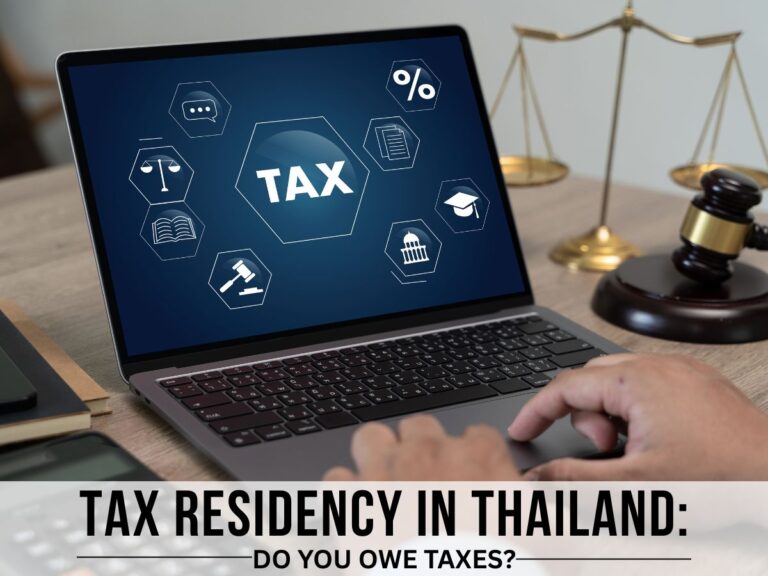One of the most common questions we hear from foreigners is, “Do I owe taxes in Thailand?” The answer varies depending on a number of factors, including whether you work here, how long you stay in the country, where you earn your money, and even when you send money into Thailand. Understanding a few key rules on tax residency can help you manage your obligations and avoid double taxation.
What Tax Residency Means
Finding out if you are regarded as a tax resident in Thailand is the first step. This only refers to the amount of time you spend in the country; it has nothing to do with whether you have a work permit, a home, or a business here.
You are deemed a tax resident if you spend 180 days or more in Thailand in a single calendar year. This implies that you might be required to report all of your worldwide income, including money earned overseas, to the Thai Revenue Department.
Generally, you are only taxed on income earned in Thailand (such as profits from a Thai business, rental income from Thai real estate, or a salary from a Thai employer) if your stay is less than 180 days.
- Thai-Sourced Income: Regardless of your residency status, any money you make from employment or business in Thailand is subject to taxation in this country.
- Foreign-Sourced Income: This refers to earnings that come from sources other than Thailand, such as dividends, overseas salaries, or rental income from overseas real estate.
According to a recent clarification from Thailand’s Revenue Department, foreign income is taxable in Thailand if you are a tax resident and bring it into the country during the same calendar year that it was earned. Timing and preparation are now more crucial than ever for foreigners who live in Thailand but work abroad.
Double Taxation Agreements (DTAs)
You may be wondering, “Do I have to pay taxes in Thailand and my home country twice?”
Not necessarily. Thailand has double taxation agreements with many countries, including the United States, the United Kingdom, Australia, and most of Europe. These treaties help ensure that you don’t get taxed twice on the same income. However, the details can be complicated, and you might need expert advice to make sure you’re claiming treaty benefits correctly.
Common Scenarios for Foreigners
Here are a few examples of how this plays out:
Digital Nomads or Freelancers
Spend more than 180 days in Thailand and earn money online? You might need to declare that income here, especially if you transfer it into Thailand during the same year.
Retirees
Some pensions may be tax-free under treaty provisions, others may not. It’s worth checking before you rely on old advice.
Business Owners
If you run a Thai company, you’ll likely need to file corporate tax returns and pay personal tax on any salary or dividends you receive.
Why Professional Advice Matters Regarding Tax Residency Rules
Thai tax laws are changing, and the country’s foreign income regulations are being enforced more strictly. What was effective for your neighbor a few years ago might not be effective now. Getting professional advice is the best course of action, preferably from someone who is knowledgeable about both international tax matters and Thai law.
A knowledgeable advisor can help you:
- Confirm that you are a tax resident.
- Plan how and when to bring in foreign currency in Thailand.
- Benefit from agreements that prevent double taxation.
- Accurately file to stay out of trouble.
Final Thoughts
Although paying taxes isn’t the most exciting aspect of living in Thailand, doing it correctly can save you a lot of stress and possibly even a lot of money.
If you’re unsure of your situation, don’t wait until tax season. Contact our tax and legal team to arrange a consultation. We can help you create a plan that reduces your tax liability while staying in compliance and provide you with clear, practical advice.
This CONTENT has been reviewed and verified on OCTOber 2025 by:

Supat Samunram (Barrister)
Licensed Attorney-At-Law | Licensed Notarial Services Attorney, The Lawyers Council of Thailand
Legal Counselor, Central Juvenile and Family Court

PAEMIKA BUAPRASERT (Accountant & HR))
Licensed CPD in Accountancy
Specialization: Tax Planning, Full Accounting System, Financial Statement







